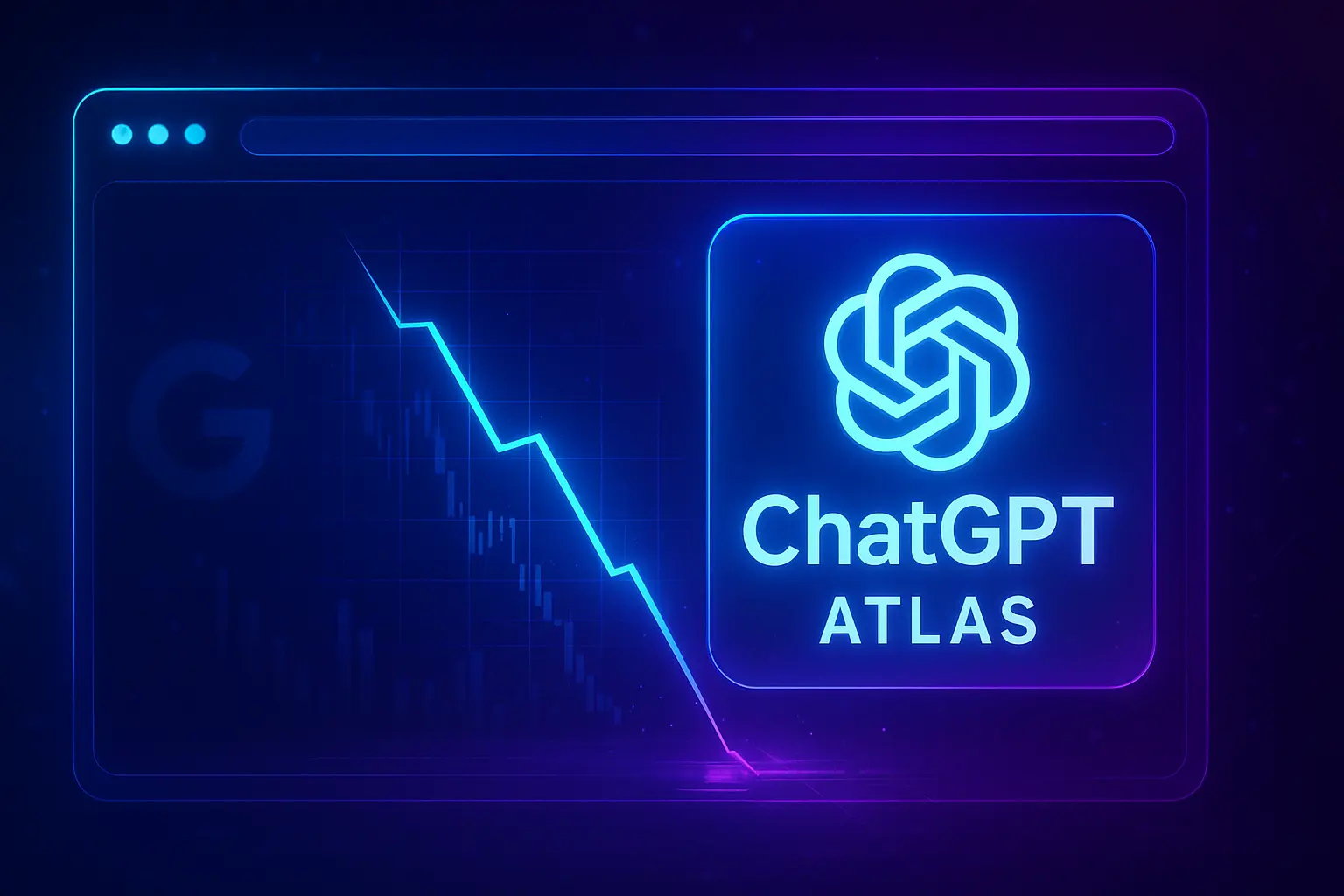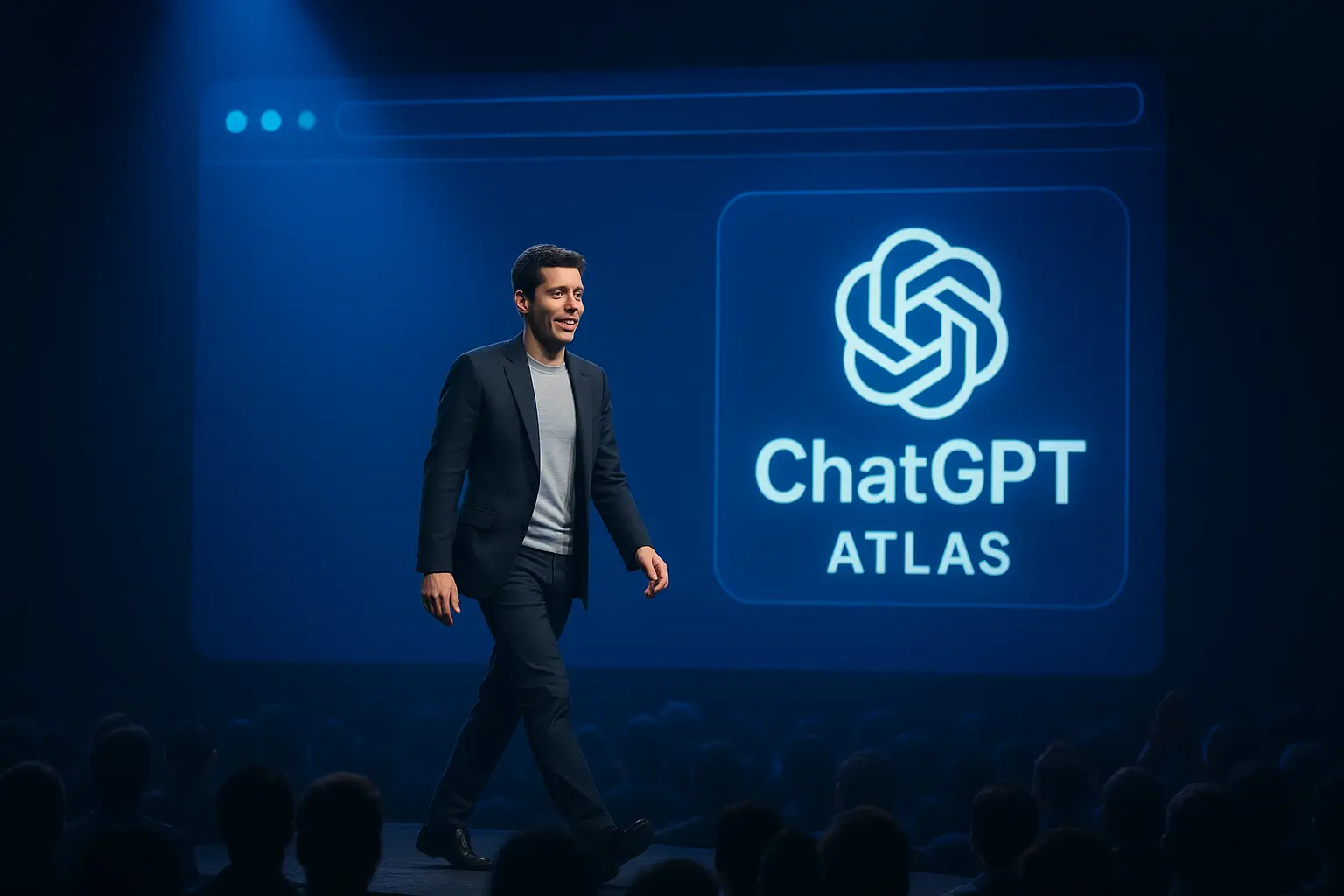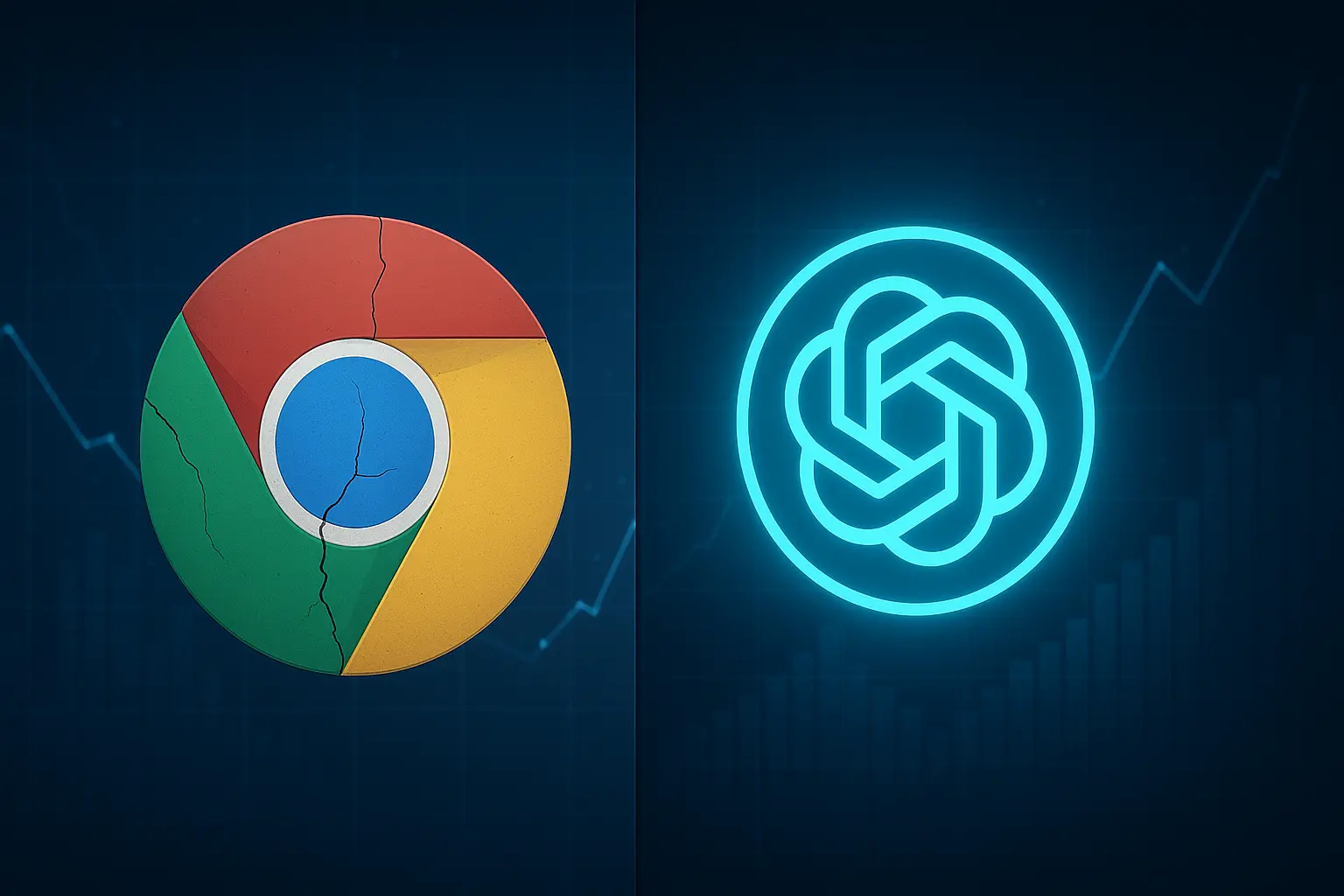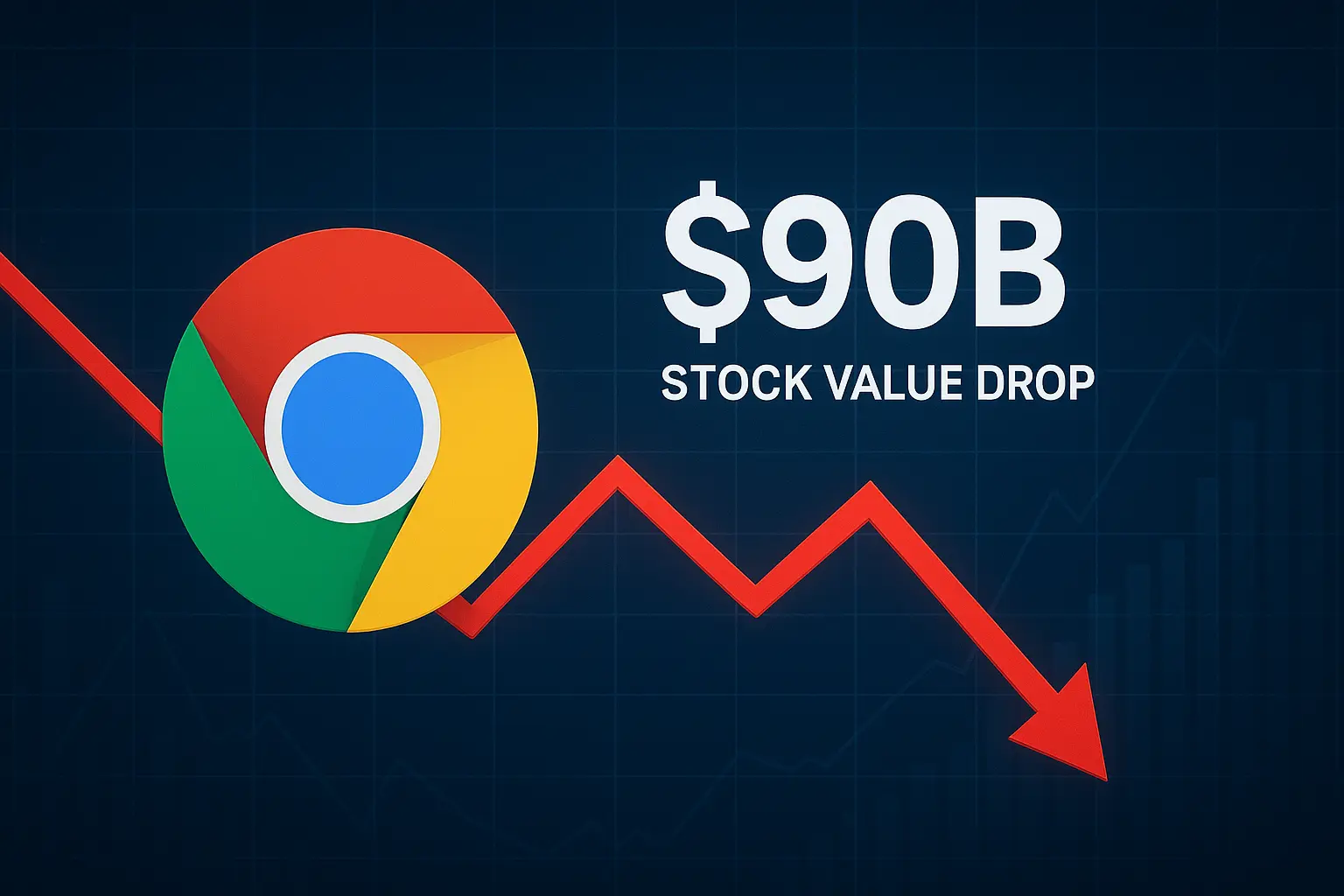
Introduction
When OpenAI dropped ChatGPT Atlas on October 21, 2025, Google's stock didn't just dip—it crashed 3.6% in a single day. We're talking about $90 billion in market value evaporating faster than your motivation on a Monday morning.
This wasn't your typical tech announcement. This was a declaration of war.
If you're interested in learning more about AI innovations and web technologies, check out my other articles on artificial intelligence and browser technologies.
In this guide, we'll explore:
Table Of Contents
- The Day Everything Changed
- What Makes ChatGPT Atlas Worth $90 Billion in Panic
- The Numbers Google Can't Ignore
- How ChatGPT Atlas Actually Works
- What This Means for the Rest of Us
- The Privacy Question Everyone's Asking
- Why Chrome Should Actually Be Worried
- The Perplexity Factor
- The Reality Check
- How to Try ChatGPT Atlas Yourself
- What Happens Next
- Conclusion

1. The Day Everything Changed
Picture this: Sam Altman walks on stage and says browsers haven't innovated since tabs were invented. Bold claim. Then he shows ChatGPT Atlas, and suddenly Chrome's 3 billion users don't seem so untouchable anymore.
Google knew this was coming. They've been scrambling to add Gemini AI to Chrome. But they were too slow. And now they're paying for it—literally.
2. What Makes ChatGPT Atlas Worth $90 Billion in Panic
Here's what freaked Google out: Atlas isn't just a browser with AI features bolted on. It's a complete reimagining of how we interact with the internet.
No Address Bar. Seriously.
You don't type URLs anymore. You talk to ChatGPT. Want to find restaurants? Ask. Need to research competitors? Just tell it. The AI-powered browser understands context, remembers what you were doing, and actually helps instead of just linking to ten blue websites.
This is Google's nightmare. Because if people stop typing searches, Google's $300 billion advertising empire starts looking shaky.
Browser Memories That Actually Work
ChatGPT Atlas has this feature called Browser Memories. It's optional, but here's why it's genius: the AI browser remembers your browsing patterns and creates connections you'd miss.
Last week you looked at fifteen job postings? Ask Atlas to summarize industry trends from all of them. It does it instantly. No copy-pasting. No opening tabs. Just answers.
Google Chrome can't do this. Neither can Edge. This is new territory.
The privacy angle is smart too. Everything's filtered on OpenAI's servers—no credit cards, no medical records, no sensitive data gets stored. You can delete memories anytime. It's transparent in a way Chrome never was.
Agent Mode Is the Real Game-Changer
If you're on ChatGPT Plus, Pro, or Business, you get Agent Mode. This is where things get wild.
The AI browser can:
- Book restaurant reservations autonomously
- Order groceries from your recipe
- Conduct competitive research across multiple sites
- Schedule meetings without the email tennis
It asks permission before doing anything. Pauses on banking sites. Can't access your passwords. But within those boundaries? It's like having a personal assistant who never sleeps.
This is what terrifies Google. Because Atlas doesn't just help you search—it completes tasks. That's a fundamental shift in how people use the internet.
3. The Numbers Google Can't Ignore
The AI browser market was worth 76.8 billion. That's a 32.8% growth rate annually.
OpenAI has 800 million weekly active users on ChatGPT. That number doubled since February. Now imagine even 10% of them making Atlas their default browser.
That's 80 million people who might stop using Google Search. Who might stop clicking Google Ads. Who might stop generating the revenue that makes Alphabet worth $2 trillion.
Suddenly that $90 billion stock drop makes perfect sense.
4. How ChatGPT Atlas Actually Works
I've been testing it on macOS (Windows and mobile versions are coming soon). The experience is genuinely different.
The ChatGPT Sidebar
There's a persistent ChatGPT companion on the side of every webpage. Hit "Ask ChatGPT" and it analyzes whatever you're reading. Need to rewrite text? Cursor chat lets you edit inline without switching apps.
It's the kind of seamless AI integration Chrome promised but never delivered.
Conversational Search That Gets It

New tabs open to a chat interface, not a search box. You can ask follow-up questions. The AI browser remembers what you asked three queries ago. Search results come with chat-first answers, not just links.
Interestingly, the search still seems powered by Google. OpenAI hasn't fully cut that cord yet. But the way results are presented? Completely different. And that's what matters to users.
Agent Mode in Action
I tested the autonomous features. Asked it to find the cheapest flight to Tokyo next month and book it.
It worked. Slowly—this is still early—but it worked. No clicking through five travel sites. No comparing tabs. Just a conversation that ended with a booking confirmation.
That's the future Google was supposed to build. OpenAI got there first.
5. What This Means for the Rest of Us
If You're a Student: Atlas generates practice questions from lecture slides automatically. No screenshots, no manual work. Just smarter studying.
If You're a Professional: Draft emails in Gmail without leaving your inbox. Analyze competitor websites and get summaries. Schedule meetings by telling your browser what you need.
If You're a Creator: Inline text rewriting. SEO optimization without switching tabs. Content summarization that actually understands context.
If You're Anyone Who Hates Busywork: Agent mode handles repetitive web tasks while you focus on work that actually matters.
6. The Privacy Question Everyone's Asking
Look, I get it. An AI browser that remembers everything and can act autonomously? That's either amazing or terrifying depending on your privacy stance.
OpenAI's been surprisingly transparent:
- Browsing data isn't used for AI training by default
- You can opt in if you want to help improve the model
- Incognito mode works like traditional browsers
- You control which sites ChatGPT can access
- Agent mode actions don't appear in your history
- Browser memories get deleted within 7 days unless you save them
Security expert Simon Willison flagged potential prompt injection risks. That's real. Combining web data with chatbot capabilities creates attack vectors we haven't fully mapped.
But compared to Chrome's data collection? Atlas is refreshingly honest about what it's doing with your information.
7. Why Chrome Should Actually Be Worried
Google has 71.86% browser market share. That's dominance most companies dream about. But dominance breeds complacency.
Chrome hasn't meaningfully innovated in years. They added Gemini AI recently, but it feels tacked on. Like they're checking a box instead of reimagining the experience.
Atlas is built AI-first. Every feature assumes you want help, not just links. That philosophical difference matters.
Plus, OpenAI has momentum. ChatGPT went from 400 million to 800 million weekly users in eight months. That's not just growth—that's cultural adoption.
If even 5% of those users switch their default browser, Chrome loses 150 million people. That's Microsoft Edge's entire user base.
8. The Perplexity Factor
OpenAI isn't the only one hunting Chrome. Perplexity launched Comet in July 2025. It's good—really good for research.
But here's the key difference: Comet helps you find information. Atlas helps you get things done.
Comet is for when you need to understand something deeply. Atlas is for when you need to book a flight, order groceries, or schedule meetings. Different use cases, different audiences.
The AI browser market is big enough for both. But Google? They're losing ground on both fronts.
9. The Reality Check

Let's be honest: ChatGPT Atlas isn't perfect.
It's macOS-only right now. That's a problem when you're trying to dethrone a browser available everywhere.
Agent mode is described as an "early experience." Translation: it'll mess up sometimes. In testing, it was slower than doing things manually for simple tasks.
The security concerns are real. We're in uncharted territory with AI agents that can interact with websites on your behalf.
And Chrome's 3 billion users aren't switching overnight. Browser habits are sticky. People hate change.
But here's what OpenAI gets: they don't need everyone. They just need the early adopters. The people who drive trends. The ones who made Chrome dominant by convincing their less-tech-savvy friends to switch from Internet Explorer.
10. How to Try ChatGPT Atlas Yourself
Curious? Here's how to get started:
- Go to chatgpt.com/atlas
- Download for macOS (only platform available now)
- Install and sign into your ChatGPT account
- Import bookmarks and passwords from Chrome or Safari
- Configure your privacy settings and browser memories
- Enable Agent Mode if you're a Plus/Pro subscriber
- Set Atlas as default for increased rate limits (first 7 days)
Fair warning: there's a learning curve. You're unlearning years of URL-typing muscle memory. Give it a week before judging.
11. What Happens Next
Google isn't going down without a fight. They have resources OpenAI can only dream about. But they also have legacy systems and advertiser relationships that limit how disruptive they can be.
OpenAI has nothing to lose. They can reinvent browsing from scratch because they don't have billions in search ad revenue to protect.
The AI browser market is projected to hit $76.8 billion by 2034. That's not just a new product category—it's a fundamental shift in how we access the internet.
Sam Altman called this "a once-a-decade opportunity to rethink what a browser can be." Looking at Google's $90 billion stock drop, the market agrees.
We're not just watching a product launch. We're watching the browser wars reignite—with AI as the ultimate weapon.
And this time? Google's the one playing defense.
12. Conclusion
By following the evolution of ChatGPT Atlas, you can understand where web browsing is headed. OpenAI has created an AI-powered browser that doesn't just search—it acts, remembers, and assists in ways Chrome never imagined.
Here are some key takeaways about ChatGPT Atlas:
- Revolutionary interface: No traditional address bar—just conversational AI navigation
- Browser Memories: Optional context retention that creates intelligent connections across your browsing
- Agent Mode: Autonomous task completion for premium users
- Privacy-first approach: Transparent data handling with user controls
- Market disruption: $90 billion stock impact shows this isn't just hype
The question isn't whether AI browsers will replace traditional ones—it's how quickly it will happen. OpenAI fired the first shot. Google's scrambling to respond. And we, as users, get to watch the most significant browser innovation since tabs were invented.
The internet just changed forever. Are you ready?
ChatGPT Atlas is available now for Free, Plus, Pro, and Go users on macOS. Windows, iOS, and Android versions are in development. The global AI browser market is expected to grow from 76.8B by 2034, with a 32.8% CAGR.
Ready to Implement This in Production?
Skip the months of development and debugging. Our team will implement this solution with enterprise-grade quality, security, and performance.